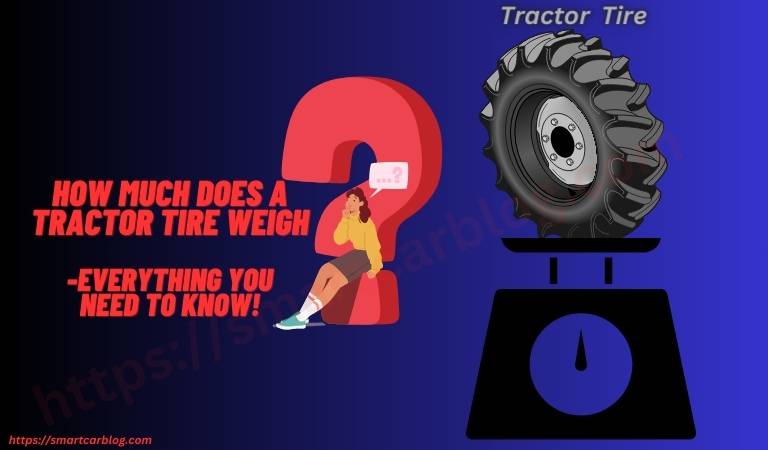When managing a farm or working in the agricultural sector, the machinery you use can greatly impact your efficiency and productivity. One aspect not to overlook is “How much does a tractor tire weigh?” This may seem like a minor detail, but the weight of a tractor tire is crucial for various reasons, including safety, fuel efficiency, and the overall performance of the tractor.
Whether you’re purchasing new tires or are curious about the specs of your current equipment, understanding the heft of these tires can lead to better maintenance decisions and, ultimately, a more effectively run operation.
Table of Contents
ToggleThe Importance of Knowing Tractor Tire Weight
The weight of a tractor tire plays a pivotal role in the functionality of your farming equipment. It affects the tractor’s stability, traction, and the ease with which it can navigate different types of terrain. For instance, heavier tires can provide better grip and stability, which is essential when working on uneven or slippery surfaces.
Knowing the weight also helps in maintaining the correct tire pressure and avoiding undue wear and tear. This knowledge is not only a technical necessity; it’s a component of smart farming that ensures the longevity and reliability of your machinery.
Factors Influencing the Weight of Tractor Tires
Several factors contribute to the weight of tractor tires. Firstly, the size of the tire is a primary factor – larger tires naturally weigh more. But beyond size, the construction materials play a part. Tires with reinforced sidewalls and additional ply layers for durability will weigh more than those with standard builds. The tread pattern is another aspect; deeper treads for better traction add to the weight.
Lastly, the type of tire – whether it’s a standard pneumatic tire, a solid tire, or a modern airless tire – also determines its weight. Understanding these factors can assist farmers and agricultural professionals in choosing the right tires for their machinery, striking a balance between the weight and the tractor’s intended use.
The Anatomy of a Tractor Tire
Tractor tires, though often seen as simple rubber rings, are actually complex pieces of engineering. They consist of various elements that collectively determine their weight and performance. In this article, we’ll break down the anatomy of a tractor tire and explore how its components influence its weight.
Materials Used in Tractor Tire Construction
The materials employed in the construction of tractor tires are a significant factor in determining their weight. These tires are typically crafted from a blend of rubber compounds, steel belts, and fabric layers. Different manufacturers and tire models may utilise slightly different materials, with some incorporating additional reinforcements.
These additional layers and materials can increase the overall weight of the tire. Understanding the materials used is key to comprehending why some tractor tires are heavier than others.
How Size Affects Weight
The size of a tractor tire is one of the most straightforward factors influencing its weight. It’s a basic principle: larger tires generally weigh more than smaller ones. Dimensions like diameter, width, and rim size typically measure tire size.
As these dimensions increase, so does the tire’s weight. While larger tires offer advantages such as improved traction and load-bearing capacity, they also come with the trade-off of increased weight, which can affect factors like fuel efficiency and the overall performance of the tractor.
Common Tractor Tire Sizes and Their Weights
For a more concrete understanding of how size affects weight, let’s explore some common tractor tire sizes and their approximate weights. Keep in mind that these numbers can vary based on factors like tire construction and brand:
- Compact Tractor Tire (11.2-24): Approximately 80-100 pounds
- Standard Farm Tractor Tire (18.4-38): Approximately 250-400 pounds
- Large Agricultural Tractor Tire (20.8-42): Approximately 600-800 pounds
The Role of Tire Treads and Patterns in Weight
The tread design and pattern on a tractor tire also play a significant role in its overall weight. Tires with deeper and more intricate tread patterns, designed to offer superior traction and soil clearance, often weigh more than tires with simpler treads. The tread is a critical component that directly impacts the tire’s performance on various terrains.
So, when selecting tires for specific farming applications, it’s essential to consider the trade-off between weight and functionality that different tread designs offer.
How Much Does a Tractor Tire Weigh?: Average Weights of Different Tractor Tires
Tractor tires are not one-size-fits-all, and their weight varies depending on the type and purpose of the tractor. Understanding the average weights of different tractor tires is essential for selecting the right ones for your specific farming needs.
In this article, we’ll explore the typical weights of different tractor tire categories, including compact utility, row crop, and 4WD tractor tires. Additionally, we’ll discuss the distinctions between the weights of front and rear tractor tires.
Compact Utility Tractor Tires
Compact utility tractors are known for their versatility and are commonly used on smaller farms and properties. The tires designed for these tractors are generally lightweight, making them ideal for tasks that require maneuverability and minimal soil compaction.
On average, compact utility tractor tires weigh between 50 to 150 pounds each. The weight varies depending on the tire’s size and construction, with smaller tires being lighter and larger ones slightly heavier.
Row Crop Tractor Tires
Row crop tractors are frequently used in precision farming practices to cultivate crops in rows. Their tires are designed for efficiency and minimal soil disturbance. Compared to compact utility tractor tires, row crop tractor tires tend to be heavier due to their larger size and load-bearing capacity. On average, row crop tractor tires can weigh between 250 and 500 pounds each, with the exact weight determined by factors such as tire size and tread design.
4WD Tractor Tires
Four-wheel-drive (4WD) tractors are heavy-duty workhorses used for demanding agricultural tasks. These tractors require tires capable of handling substantial loads and providing superior traction.
Consequently, 4WD tractor tires are significantly heavier than those found on smaller tractors. On average, 4WD tractor tires can weigh between 600 to 1,000 pounds each, with larger models often exceeding this range.
Comparing Weights: Front vs. Rear Tractor Tires
Another important consideration when assessing tractor tire weights is the distinction between front and rear tires. Front tractor tires tend to be lighter than their rear counterparts due to their smaller size and the fact that they bear less of the tractor’s weight. Front tractor tires typically weigh between 50 to 300 pounds each, depending on their size and intended use.
In contrast, rear tractor tires are designed for carrying heavy loads and providing the necessary traction for fieldwork. They can weigh anywhere from 300 to 1,500 pounds each, with larger rear dual tires on large tractors often falling towards the higher end of this weight range.
Understanding the average weights of different tractor tires and the variations between front and rear tires is crucial for selecting the appropriate tires to optimize your tractor’s performance in various farming applications.
Impact of Tire Weight on Tractor Performance
The weight of tractor tires is a critical factor that significantly influences the overall performance of agricultural machinery. In this article, we’ll explore the various aspects of how tire weight affects tractor performance, including its impact on fuel efficiency, traction, stability, and considerations related to soil compaction.
Fuel Efficiency and Tire Weight
One of the most noticeable consequences of tractor tire weight is its effect on fuel efficiency. Heavier tires can lead to increased fuel consumption, as the tractor’s engine has to work harder to move the added weight. This results in higher operational costs and a reduced number of hours a tractor can work on a single tank of fuel. Farmers and operators often need to strike a balance between tire weight and fuel efficiency to ensure cost-effective and sustainable agricultural practices.
Traction and Stability
Traction and stability are essential factors in agricultural work, especially when traversing uneven terrain or working in adverse weather conditions. Heavier tractor tires can provide better traction due to their increased downward force on the ground. This added traction is beneficial for tasks like ploughing, tilling, and pulling heavy loads.
Moreover, the weight of the tires contributes to the overall stability of the tractor, reducing the risk of tipping over during operations. However, there is a fine line between sufficient weight for traction and excessive weight that may compromise manoeuvrability.
Soil Compaction Considerations
Soil compaction is a concern for farmers because it can negatively impact crop yields and soil health. Heavy tractor tires exert greater pressure on the soil, leading to compaction, which can hinder root growth and water infiltration. Farmers must be mindful of tire weight and its effects on soil compaction, especially when working in fields that require careful soil management. In such cases, choosing tires with lower weight or implementing tire inflation systems can help mitigate soil compaction issues while maintaining tractor performance.
Understanding the multifaceted impact of tire weight on tractor performance is essential for making informed decisions when selecting and using tractor tires. By carefully considering factors like fuel efficiency, traction, stability, and soil compaction, farmers and operators can optimize their equipment for efficient and sustainable agricultural practices.
Must Read: How Long Does A Tire Rotation Take?
Must Read: How Much Are Used Tire?
Weight Variations: Air-filled vs. Solid vs. Liquid-filled Tires
Tractor tires come in various types, and one critical factor that distinguishes them is their weight. In this article, we’ll explore the weight variations among different types of tractor tires, including air-filled, solid, and liquid-filled tires. We’ll delve into the benefits and drawbacks of each type and discuss scenarios for their best use in agricultural applications.
Benefits and Drawbacks of Air-filled Tires
Benefits:
- Adjustable Pressure: Air-filled tires allow for pressure adjustments, which can impact the tire’s weight and performance. Lowering tire pressure can reduce soil compaction while increasing pressure provides better traction on some terrains.
- Shock Absorption: These tires offer a cushioning effect due to the air inside, resulting in a smoother ride and reduced stress on the tractor’s suspension system.
Drawbacks:
- Punctures and Flats: Air-filled tires are susceptible to punctures and flats, which can be a significant drawback in rough or debris-strewn fields.
- Maintenance: Regular maintenance, including checking and adjusting tire pressure, is necessary to keep them performing optimally.
Benefits and Drawbacks of Solid Tires
Benefits:
- No Flats: Solid tires are puncture-proof, making them highly reliable for use in environments with sharp objects or debris.
- Durability: They have a long lifespan and are resistant to wear and tear, reducing the need for frequent replacements.
Drawbacks:
- Limited Shock Absorption: Solid tires lack the cushioning effect of air-filled tires, which can lead to a rougher ride and increased stress on the tractor.
- Fixed Weight: Their weight is generally fixed and cannot be adjusted, which may limit their suitability for certain applications.
Benefits and Drawbacks of Liquid-filled Tires
Benefits:
- Puncture Resistance: Similar to solid tires, liquid-filled tires are resistant to punctures and flats, making them dependable in challenging conditions.
- Weight Distribution: The liquid filling inside these tires can be adjusted to distribute weight evenly, helping reduce soil compaction.
Drawbacks:
- Weight: Liquid-filled tires are heavier compared to air-filled tires, which can affect fuel efficiency and overall tractor performance.
- Cost: They are generally more expensive than traditional air-filled tires.
Scenarios for Best Use
- Air-filled Tires: These are versatile and suitable for a wide range of applications, making them a common choice for general farm use.
- Solid Tires: Ideal for environments with a high risk of punctures or on equipment that operates exclusively on rough surfaces.
- Liquid-filled Tires: Best for situations where weight distribution and puncture resistance are crucial, such as precision farming and applications that require reduced soil compaction.
Understanding the weight variations and characteristics of air-filled, solid, and liquid-filled tractor tires allows farmers and operators to choose the most appropriate tire type for their specific agricultural needs, ultimately optimizing tractor performance and efficiency.
How to Determine the Weight of Your Tractor Tires
Knowing the weight of your tractor tires is essential for various reasons, from maintenance and safety to making informed decisions about tire replacements. In this article, we’ll explore different methods for determining the weight of your tractor tires, including DIY approaches and when it’s advisable to consult with a professional.
DIY Methods for Weighing Tractor Tires
- Bathroom Scale Method:
- One simple DIY method is to use a bathroom scale. Place the scale on a flat, level surface and position one tire at a time onto the scale.
- Ensure that the tire’s entire surface is resting on the scale for an accurate measurement.
- Record the weight and repeat this process for each tire.
2. Leverage and Weighing Scale:
- This method involves using a lever, like a wooden beam, to lift one end of the tractor tire.
- Place a weighing scale under the elevated end of the tire and carefully lower the tire onto the scale.
- The reading on the scale will provide the weight of the tire. Be cautious when using this method to prevent accidents.
3. Water Displacement Method:
- For smaller tires, you can use the water displacement method. Fill a container with water and place it on a scale.
- Submerge the tire in the water and measure the amount of water displaced.
- The weight of the water displaced is equal to the weight of the tire.
When to Consult with a Professional
While DIY methods can provide a reasonable estimate of your tractor tire’s weight, there are instances where it’s best to consult with a professional:
- Large or Heavy Tires: If your tractor uses exceptionally large or heavy tires, it may be challenging to obtain accurate measurements with DIY methods. In such cases, a professional scale or equipment may be necessary.
- Precision Needs: When precise measurements are critical, such as for specific agricultural or industrial applications, professional services with specialized weighing equipment may be required to ensure accuracy.
- Safety Concerns: Safety should always be a top priority. If there are any doubts about safely weighing tractor tires using DIY methods, it’s wise to seek assistance from a professional to avoid accidents or damage.
- Legal Requirements: In some jurisdictions, there may be legal requirements for weighing certain types of equipment, including agricultural machinery. Consulting with a certified professional may be necessary to meet these regulations.
Knowing how to determine the weight of your tractor tires empowers you to make informed decisions about maintenance and usage. While DIY methods are suitable for many situations, there are circumstances where the expertise of a professional becomes invaluable to ensure safety and accuracy.
The Logistics of Shipping and Handling Heavy Tractor Tires
Shipping and handling heavy tractor tires can be a challenging task that requires careful planning and safety considerations. In this article, we’ll explore the logistics involved in shipping and handling these substantial agricultural components. We’ll discuss how to prepare for transport and provide important safety tips to ensure a smooth and secure process.
Preparing for Transport
Assess Tire Weight and Dimensions:
- Before shipping or handling tractor tires, it’s crucial to assess their weight and dimensions accurately. This information helps in selecting the right equipment and methods for transport.
Select Proper Equipment:
- Depending on the size and weight of the tires, you may need specialized equipment such as forklifts, loaders, or cranes to lift and move them safely.
Secure the Tires:
- Use appropriate straps, chains, or cradles to secure the tires in place during transport. Ensure that they are fastened tightly to prevent shifting or rolling during transit.
Balance the Load:
- If you’re transporting multiple tires, distribute the weight evenly to prevent imbalances that could lead to accidents or damage.
Safety Tips for Handling Heavy Tires
Personal Protective Equipment (PPE): Always wear appropriate PPE, including safety gloves, steel-toed boots, and eye protection when handling heavy tractor tires.
Teamwork and Communication: When moving or positioning heavy tires, work as a team and communicate clearly. Use hand signals or radios to coordinate movements.
Proper Lifting Techniques: When lifting heavy tires, use proper lifting techniques. Bend at the knees, not the waist, and keep your back straight to avoid injury.
Clear Pathways: Ensure that pathways are clear of obstacles and debris to prevent tripping or accidents during tire transport.
Stay Alert: Stay alert and focused during the entire handling process. Avoid distractions to maintain safety.
Training and Certification: If handling heavy tires is part of your job, consider obtaining proper training and certification in equipment operation and safety protocols.
Shipping and handling heavy tractor tires require careful attention to detail and a commitment to safety. By adequately preparing for transport and following essential safety guidelines; you can minimize risks and ensure the efficient movement of these vital agricultural components.
Conclusion: How Much Does a Tractor Tire Weigh?
In the world of agriculture and heavy machinery, the weight of tractor tires is not just a trivial detail but a critical factor that impacts performance, efficiency, and safety. Throughout this article, we’ve explored the various facets of tractor tire weight, from understanding the average weights of different tire categories to delving into the pros and cons of different tire types.
We’ve discussed how tire weight affects crucial aspects such as fuel efficiency, traction, stability, and even soil compaction. Farmers and tractor operators face the constant challenge of balancing the need for weight to optimize performance against potential drawbacks, like increased fuel consumption or soil compaction.
We’ve also touched on the different types of tractor tires, including air-filled, solid, and liquid-filled variants, each with its own set of benefits and limitations. Making the right choice among these tire types is vital to match the specific needs of your farming operations.
Additionally, we’ve explored how to determine the weight of your tractor tires, covering DIY methods for those looking to get a rough estimate and when it’s advisable to consult with professionals for precise measurements.
Lastly, we’ve delved into the logistics of shipping and handling heavy tractor tires, emphasising the importance of careful preparation and strict adherence to safety guidelines.
In conclusion, understanding how much a tractor tire weighs and its implications for your agricultural equipment is crucial. It enables you to make informed decisions about tire selection, maintenance, and safe handling. Whether you’re a seasoned farmer or just starting in the agricultural field, having a comprehensive grasp of tractor tire weight will empower you to optimise your machinery’s performance and ensure the efficiency and safety of your farming operations.
FAQ: How Much Does a Tractor Tire Weigh?
Q: What’s the average weight of a tractor tire?
A: The average weight of a standard tractor tire ranges from 400 to 600 pounds (181 to 272 kilograms). However, the size and type of the tire can lead to significant variances in weight.
Q: Can you tell me the weight of large agricultural tractor tires?
A: Large agricultural tractor tires, designed for high-performance tasks, typically weigh between 800 to 1000 pounds (363 to 454 kilograms) each, reflecting their robust construction and durability.
Q: How heavy is a front loader tractor tire?
A: Front loader tractor tires are slightly lighter, generally weighing in at about 200 to 300 pounds (90 to 136 kilograms) since they are smaller in size compared to rear tires.
Q: What factors influence the weight of a farm tractor tire?
A: The weight of a farm tractor tire is influenced by its size, tread design, and construction material. Larger tires with deeper treads for heavy-duty work tend to be heavier.
Q: Do fluid-filled tractor tires weigh more?
A: Yes, fluid-filled tractor tires weigh more due to the added weight of the liquid inside. This can add 400 to 700 pounds (181 to 318 kilograms) per tire.
Q: What’s the weight difference between radial and bias ply tractor tires?
A: Radial tractor tires usually weigh more than bias-ply tires due to their reinforced construction. The difference can be around 10-15% more for radials.
Q: How much do industrial tractor tires weigh?
A: Industrial tractor tires, designed for construction and heavy lifting, can weigh anywhere from 500 to 800 pounds (227 to 363 kilograms) depending on their size and specification.
Q: Are there significant weight differences among various tractor tire brands?
A: Yes, weight can vary among brands due to different designs and material compositions. It’s always best to check the manufacturer’s specifications for the exact weight.
Q: How does the weight of modern tractor tires compare to older models?
A: Modern tractor tires may weigh more than older models due to advancements in technology and materials, which provide improved durability and performance.
Q: Why is it important to know the weight of a tractor tire?
A: Understanding the weight of a tractor tire is crucial for safety, performance, and maintenance. Heavier tires increase stability but may require stronger equipment to mount or change.




 Welcome to SmartCarBlog.com! I’m Rashel Miajee, The proud founder of smartcarblog.com. This is a part of
Welcome to SmartCarBlog.com! I’m Rashel Miajee, The proud founder of smartcarblog.com. This is a part of 


